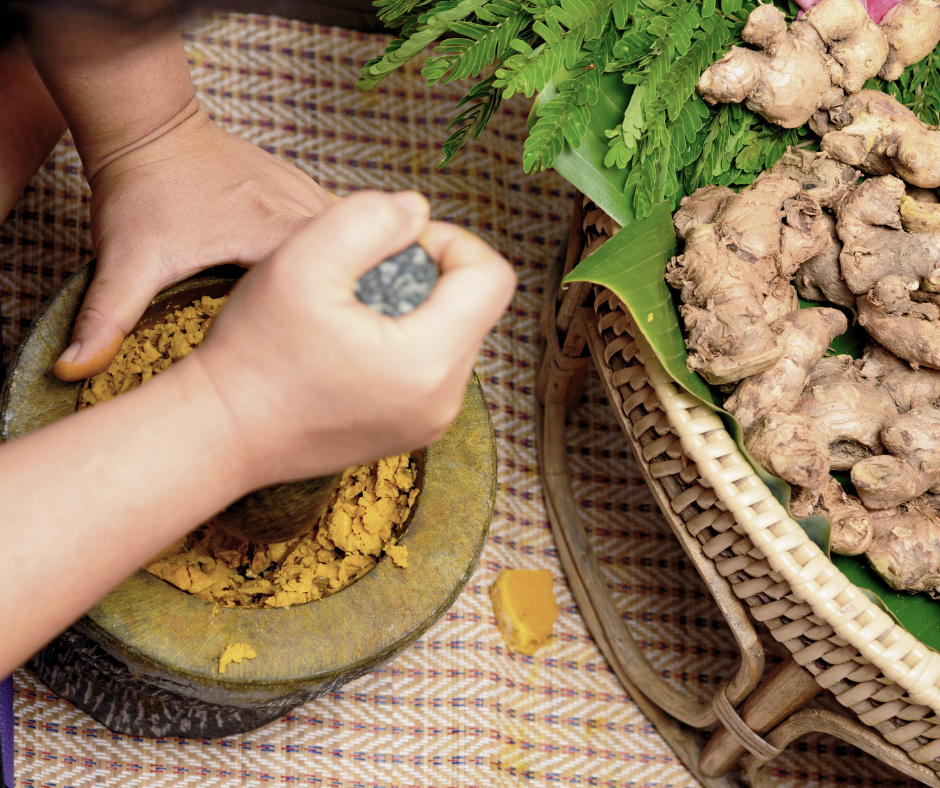

What Happens During an Ayurveda Retreat? Here’s All You Need to Know
Summary
This article provides an overview of the experiences one might expect at an Ayurveda retreat, emphasizing its benefits for mind, body, and spirit balance through personalized treatments, diet, yoga, and meditation. It outlines the principles of Ayurveda, the process of determining individual treatments based on one’s dosha, and the variety of healing practices used.
Reflection Questions
- How can Ayurveda’s holistic approach to wellness influence your current lifestyle and health practices?
- What aspects of an Ayurveda retreat do you think would be most beneficial for you, and why?
- Consider how integrating Ayurvedic principles into your daily routine could improve your overall well-being.
Journal Prompt
Reflect on your current health and wellness journey. Write about how incorporating Ayurvedic practices, such as specific dietary changes, yoga, and meditation, could address any imbalances you’re experiencing. Consider setting goals for integrating these practices into your life.
Ayurveda retreats are focused on the ancient Indian holistic healing system of Ayurveda, designed to balance the mind, body, and spirit through personalized treatments, diet, yoga, and meditation. Female entrepreneurs could greatly benefit from such a retreat due to the high levels of stress and burnout often associated with the demands of running a business. This type of wellness retreat offers a unique opportunity for deep relaxation, mental clarity, and physical rejuvenation, providing women with the necessary tools and practices to enhance their personal well-being. By learning to maintain a balance between their professional ambitions and personal health, female entrepreneurs can improve their productivity, creativity, and overall quality of life, making them more effective leaders and innovators in their respective fields. From herbal remedies and spa treatments to meditation sessions and yoga classes, ayurvedic retreats can support body and mind. Read on to learn more about how you could leverage an ayurvedic retreat for stress management and more.
What Exactly is Ayurveda?
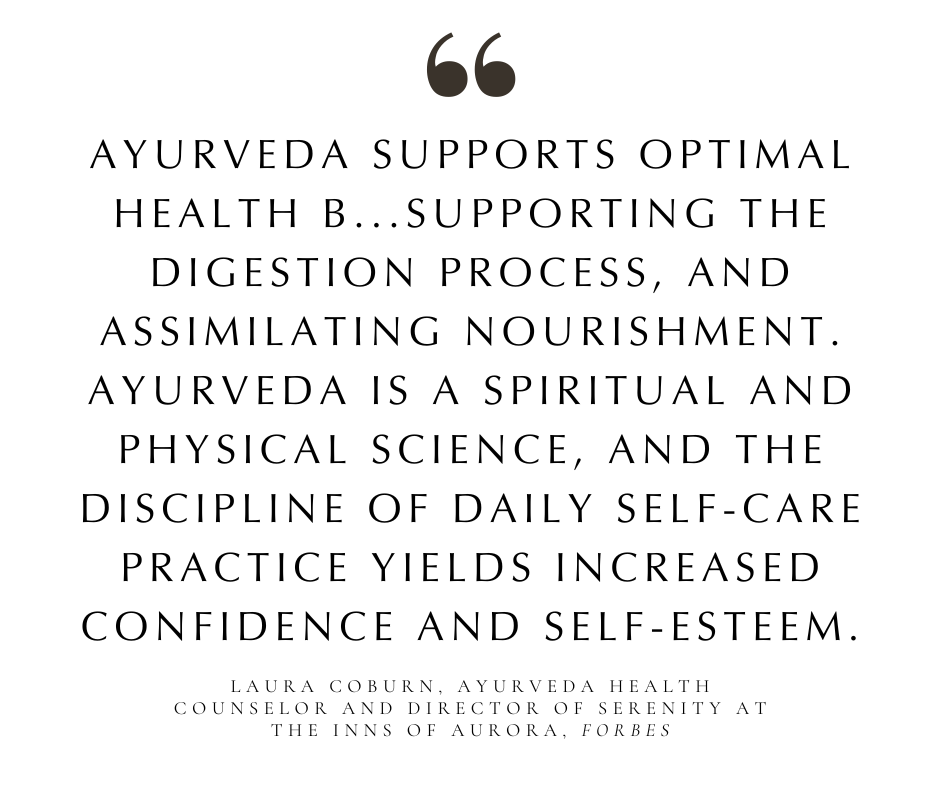

Ayurveda is a traditional system of medicine and an ancient science that originated in India over 5,000 years ago. It is one of the world’s oldest holistic healing systems. Ayurvedic principles dictate that health and wellness depend on a delicate balance between the mind, body, and spirit. The term “Ayurveda” is derived from the Sanskrit words “ayur” (life) and “veda” (science or knowledge), translating to “the science of life.”
Understanding the Three Doshas


Ayurveda emphasizes the importance of maintaining this balance through a comprehensive approach that includes diet, herbal treatments, exercise, lifestyle adjustments, and yogic practices. Central to Ayurvedic medicine is the concept of the three doshas: Vata (air and space), Pitta (fire and water), and Kapha (water and earth).
These doshas are believed to be the vital energies that govern the physiological and psychological functions of the body. Each individual is thought to have a unique constitution, or prakriti, which is a combination of the three doshas, determining one’s physical, mental, and emotional traits.
Elements of Ayurvedic Treatment


Ayurvedic practitioners use a variety of methods to diagnose imbalances, including pulse diagnosis, visual observation, and a detailed history taking. Treatment aims to restore balance and can include dietary modifications, herbal remedies, detoxification procedures (such as Panchakarma), massage, yoga, and meditation.
Beyond just treating illness, an Ayurvedic doctor focuses on the maintenance of health through close attention to balance in one’s life, right thinking, diet, lifestyle, and the use of herbs. It offers a body of wisdom designed to help people stay vibrant and healthy while realizing their full human potential.
Modern Vs. Traditional Approaches to Ayurveda


You may have heard of Maharishi Ayurveda. Many ayurvedic retreats are led by Maharishi experts. Maharishi Ayurveda represents a modern revival and global expansion of traditional Ayurvedic medicine, introduced by Maharishi Mahesh Yogi, the founder of the Transcendental Meditation (TM) movement, in the 1980s. Maharishi Ayurveda integrates the principles of traditional Ayurveda with the practice of Transcendental Meditation and concepts of Vedic science, aiming to create a more comprehensive approach to health and wellness.
Maharishi Ayurveda experts are practitioners who specialize in this specific approach. They are trained in the diagnostic and treatment methods of Ayurveda as well as in the spiritual and meditative practices that Maharishi Mahesh Yogi promoted. These experts focus on prevention and healing by addressing the root causes of illness, promoting balance in the body, mind, and consciousness.
Key aspects of Maharishi Ayurveda include pulse diagnosis, diet and lifestyle, herbal remedies, panchakarma, transcendental meditation, and vedic approaches. Maharishi Ayurveda and traditional Ayurveda share the same foundational principles and goals of promoting health and balance. However, Maharishi Ayurveda introduces certain elements and emphases that distinguish it from traditional Ayurvedic practices. Below are some key differences.
Fuel your creative fire & be a part of a supportive community that values how you love to live.
subscribe to our newsletter
How Maharishi Differs from Traditional Ayurveda
Integration with Transcendental Meditation
Maharishi Ayurveda places a significant emphasis on the practice of Transcendental Meditation (TM) as a central component of its approach to health and wellness. While traditional Ayurveda also recognizes the importance of mental and spiritual practices, Maharishi Ayurveda specifically incorporates TM to reduce stress, enhance cognitive function, and promote overall well-being.
Vedic Science
Maharishi Ayurveda is part of a broader system known as Maharishi Vedic Science, which encompasses various aspects of Vedic knowledge, including architecture (Vastu Shastra), music (Gandharva Veda), and Jyotish (Vedic astrology). These disciplines are integrated into the Maharishi Ayurveda approach to address health and wellness from multiple dimensions, which may not be as explicitly emphasized in traditional Ayurvedic practices.
Research and Standardization
There is a strong focus within Maharishi Ayurveda on scientific research and the standardization of practices and herbal remedies. This effort aims to integrate Ayurvedic wisdom with modern scientific understanding and to make Ayurvedic treatments more accessible and understandable to people unfamiliar with traditional Ayurvedic texts and practices.
What Does an Authentic Ayurveda Experience Look Like?
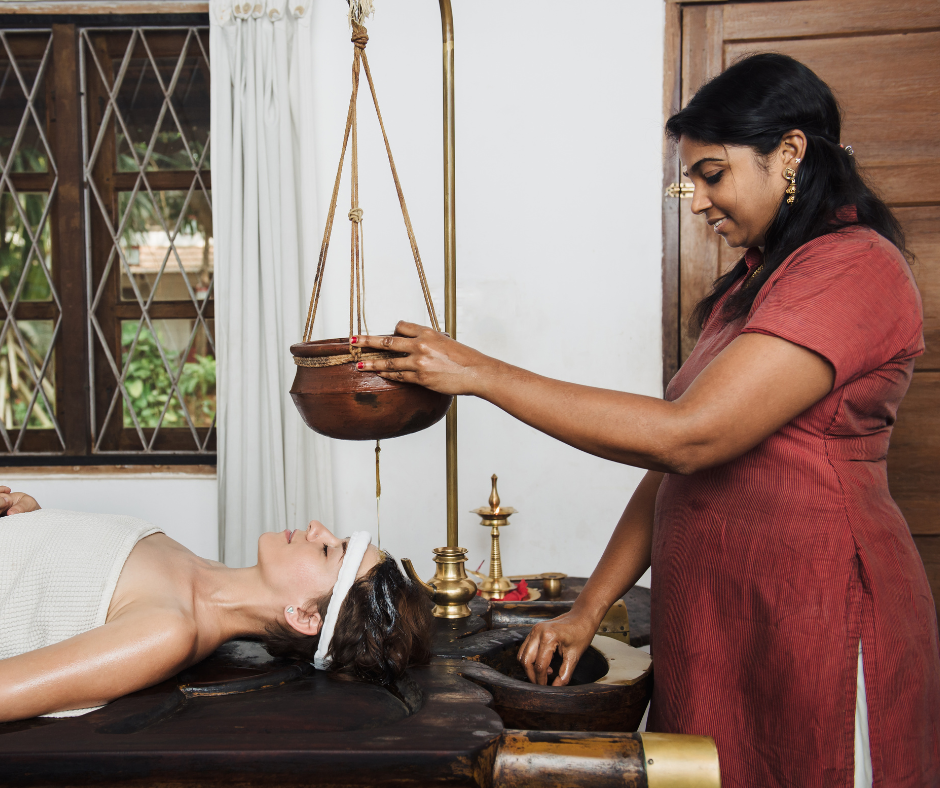

Ayurvedic treatment is a multifaceted, holistic approach that aims to address the root cause of illness and restore balance to the body, mind, and spirit for optimal health. Its elements are designed to work together to achieve holistic wellness. Each element of Ayurvedic treatment is personalized, taking into account the individual’s unique doshic balance, genetic heritage, age, gender, and the specific nature of their disorder. The aim is not only to treat disease but to promote longevity and enhance overall quality of life. From deep rest to ayurvedic cooking, below are some key components of Ayurvedic treatment.
Diet and Nutrition
Central to Ayurvedic treatment, dietary practices are tailored to an individual’s dosha (body type) and the specific imbalances they are experiencing. Ayurveda emphasizes the importance of consuming whole, fresh foods that are seasonally appropriate and beneficial for one’s dosha. Certain foods are recommended or avoided to help balance the specific energies within the body. As such, ayurveda cooking classes are commonly included in retreats.
Herbal Remedies
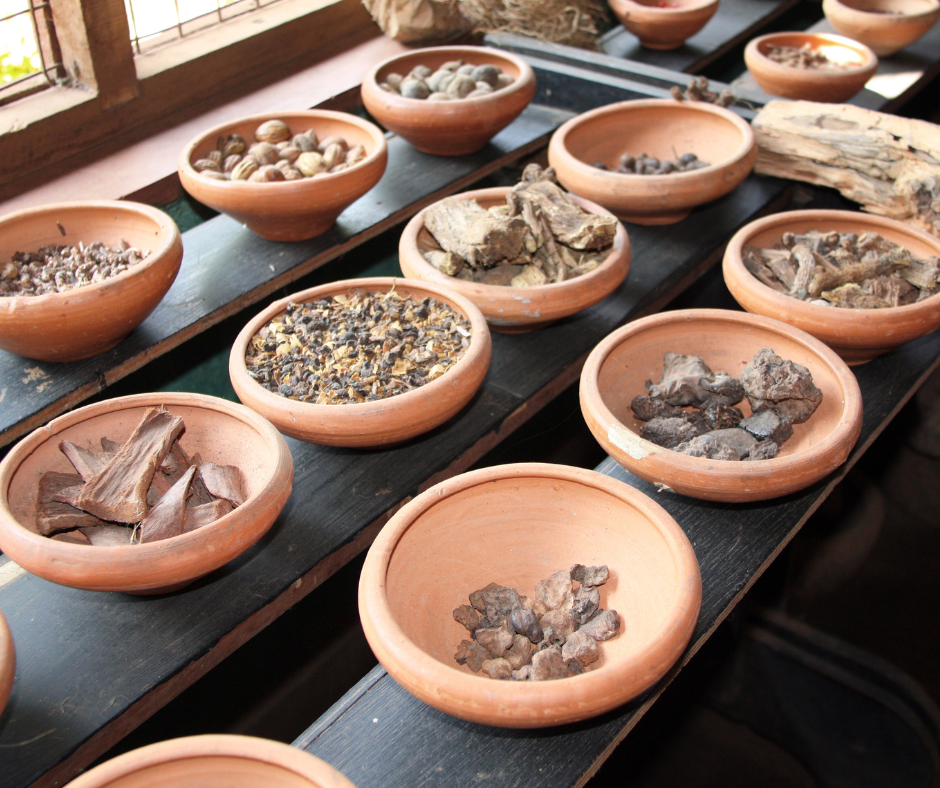

Ayurveda makes extensive use of medicinal herbs and plants to treat a wide range of conditions. These herbs are often combined into formulas that target specific doshic imbalances. Common herbs include Ashwagandha, Turmeric, Triphala, and Brahmi, each with its own set of healing properties.
Panchakarma
This is a cleansing and rejuvenation program designed to detoxify the body and restore balance. Panchakarma includes several procedures, such as therapeutic vomiting (Vamana), purgation (Virechana), enema therapy (Basti), nasal administration (Nasya), and bloodletting (Raktamokshana). The choice of procedures depends on the individual’s needs and the specific imbalances being addressed.
Ayurvedic Massage and Body Treatments
Ayurvedic oil massage (Abhyanga) uses specific oils that are chosen based on the individual’s dosha. These treatments can help to reduce stress, improve circulation, and eliminate toxins from the body. Other treatments like Shirodhara (pouring of warm oil on the forehead) are used for relaxation and mental clarity.
Yoga Sessions and Meditation


These practices are integral to Ayurvedic treatment, promoting physical flexibility, strength, mental clarity, and emotional stability. Yoga poses (asanas), breathing exercises (pranayama), and meditation are tailored to the individual’s constitution and current state of health to support overall balance and well-being.
Lifestyle Adjustments
Ayurveda emphasizes the importance of living in harmony with nature and one’s inner self. It advises on daily routines (dinacharya) and seasonal routines (ritucharya) to help maintain balance. This can include waking up early, practicing yoga, meditating, and engaging in activities that are in sync with the natural cycles of the day and the seasons.
Detoxification and Cleansing
Beyond Panchakarma, Ayurveda recommends regular practices to eliminate toxins (ama) from the body. This can include simpler practices like consuming warm water with lemon in the morning, fasting, or following a mono-diet of easy-to-digest foods.
Spiritual Healing
Ayurveda acknowledges the spiritual aspect of health and encourages practices that foster a sense of peace, purpose, and connection to the divine. This can involve meditation, chanting, spending time in nature, and participating in community service.
Here’s What to Expect at an Ayurvedic Retreat Center
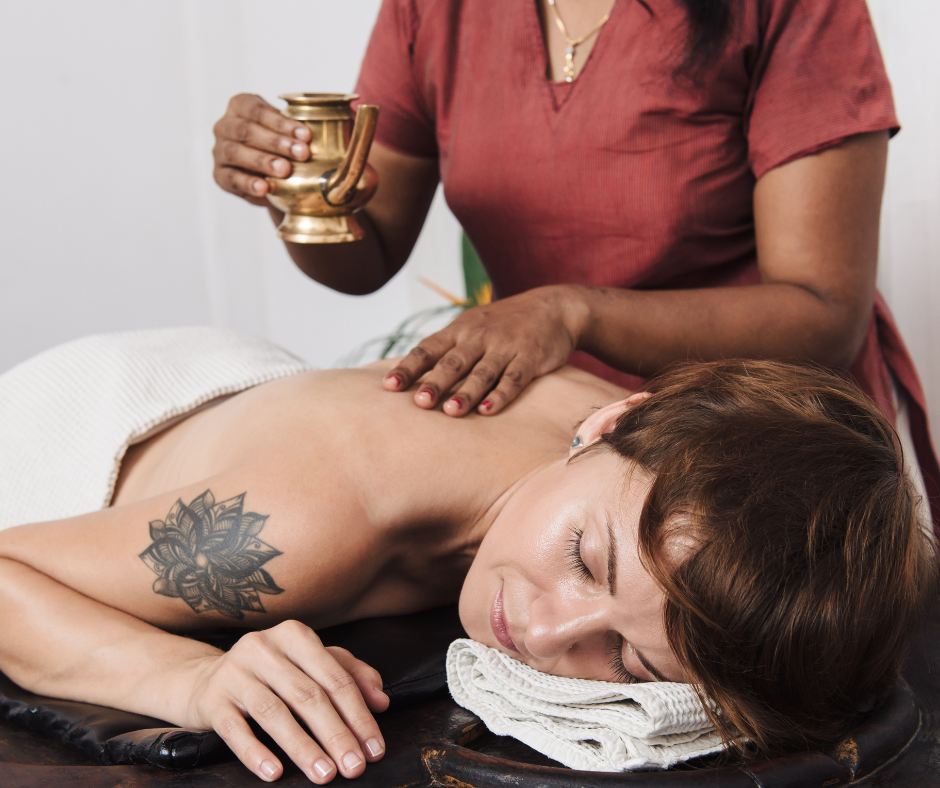

An Ayurveda retreat typically focuses on holistic wellness and healing, guided by the principles of Ayurveda, an ancient Indian system of medicine. These retreats offer a blend of relaxation, detoxification, and rejuvenation, aiming to balance the mind, body, and spirit. Here’s what usually happens during an Ayurveda retreat. Remember that each living retreat center offers different classes and treatments.
Initial Consultation with an Ayurvedic Practitioner
Upon arrival, guests often undergo a comprehensive consultation with a qualified Ayurvedic doctor. This assessment includes a discussion about lifestyle, dietary habits, health issues, and personal goals. The practitioner then determines the individual’s dosha (body type) and prescribes treatments, therapies, and a diet plan tailored to their needs.
Personalized Treatment Plan
Based on the initial consultation, a personalized treatment plan is created. This plan can include a variety of therapies such as Panchakarma (a cleansing and rejuvenation program), massage, oil treatments, herbal steam baths, and other specialized procedures that aim to detoxify and rejuvenate the body.
Ayurvedic Diet


Nutrition plays a crucial role in Ayurveda, and retreats often serve specially prepared meals that align with one’s dosha. The diet is usually vegetarian and focuses on fresh, seasonal, and locally sourced ingredients. The meals are designed to cleanse, balance, and nourish the body while supporting the treatments being received.
Yoga Classes and Meditation
Daily yoga and meditation sessions are common features of Ayurveda retreats, helping to harmonize the mind, body, and spirit. These practices are often tailored to suit the individual’s fitness level and dosha type, enhancing the effects of the Ayurvedic treatments. This is one element of the mental health support offered by ayurveda.
Educational Workshops
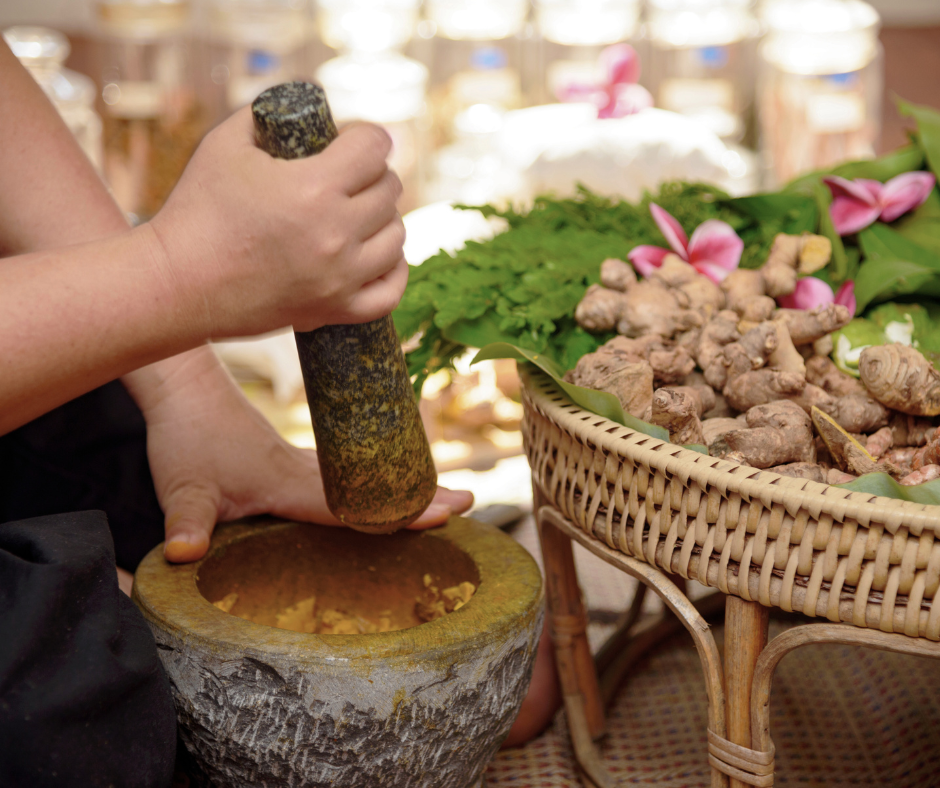

Many retreats offer workshops and lectures on Ayurvedic principles, cooking classes, herbal medicine, lifestyle management, and more. These sessions aim to provide guests with the knowledge and tools to incorporate Ayurvedic principles into their daily lives. They can help you develop the tools to relieve stress and support your physical health after you leave the ayurvedic retreat.
Relaxation and Nature Immersion
Ayurveda retreats are typically located in serene and natural settings, offering guests the chance to disconnect from their hectic lives and reconnect with nature. Time for relaxation, reflection, and enjoying the natural surroundings is an integral part of the healing process.
Follow-up and Integration
Before departure, guests may receive a follow-up consultation to assess progress and discuss how to integrate the Ayurvedic practices into their daily routine at home. This may include dietary recommendations, herbal supplements, lifestyle adjustments, and ongoing therapies.
Final Thoughts on Attending an Ayurvedic Retreat
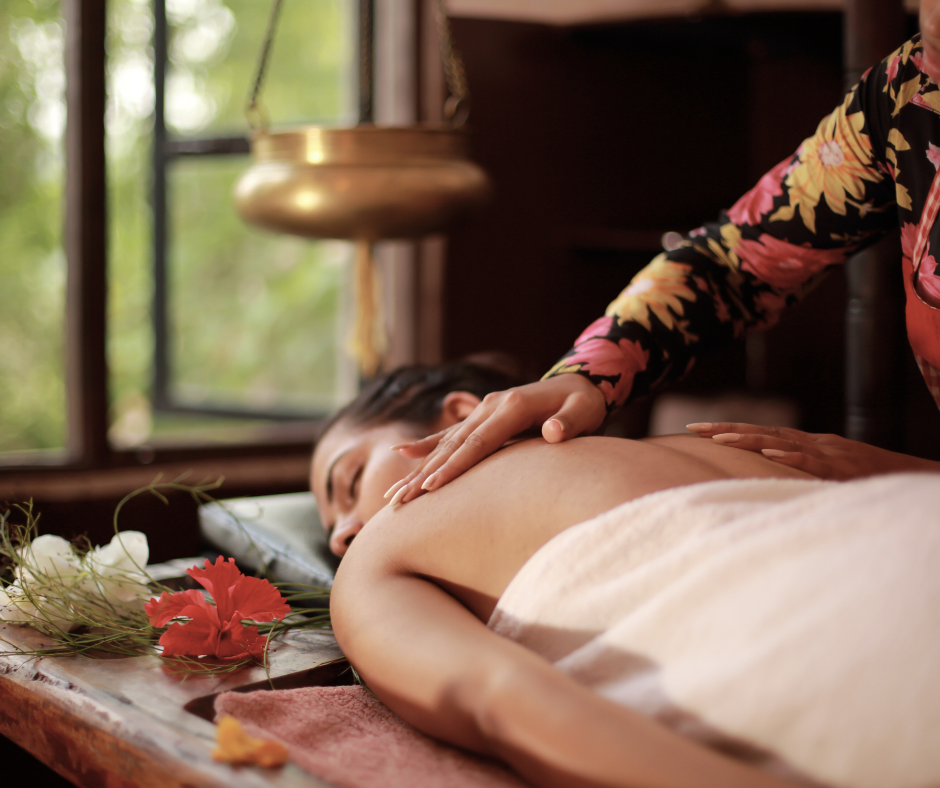

By embracing the ancient wisdom of Ayurveda, these retreats provide a unique opportunity for women to address their specific health concerns, manage stress, and find balance in their busy lives. Through personalized treatments, dietary guidance, yoga, and meditation, women can cultivate a deeper connection with their bodies and minds, leading to lasting changes in their health and well-being.
Furthermore, Ayurvedic retreats offer a supportive community and a nurturing environment that empowers women to prioritize their self-care and embark on a journey towards a more balanced, vibrant, and fulfilling life. In essence, Ayurvedic retreats are not just a temporary escape but a transformative experience that can inspire women to integrate Ayurvedic principles into their daily lives, promoting harmony, health, and happiness.
Let us know if you attend an Ayurvedic retreat in the comments below!
Design Dash
Join us in designing a life you love.
-
All About Our 7-Day Focus & Flex Challenge
Sign up before August 14th to join us for the Focus & Flex Challenge!
-
Unique Baby Names Inspired by Incredible Women from History
Inspired by historic queens, warriors, artists, and scientists, one of these unusual baby names might be right for your daughter!
-
Finding a New 9 to 5: How to Put Freelance Work on a Resume
From listing relevant skills to explaining your employment gap, here’s how to put freelance jobs on your resume.
-
What is Generation-Skipping, and How Might it Affect Sandwich Generation Parents?
The emotional pain and financial strain of generation skipping can be devastating for Sandwich Generation parents.
-
Four Material Libraries Dedicated to Sustainability, Preservation, and Education
From sustainable building materials (MaterialDriven) to rare pigments (Harvard), each materials library serves a specific purpose.
-
Do You Actually Need a Beauty Fridge for Your Skincare Products? (Yes and No.)
Let’s take a look at what dermatologists and formulators have to say about whether your makeup and skincare belong in a beauty fridge.








